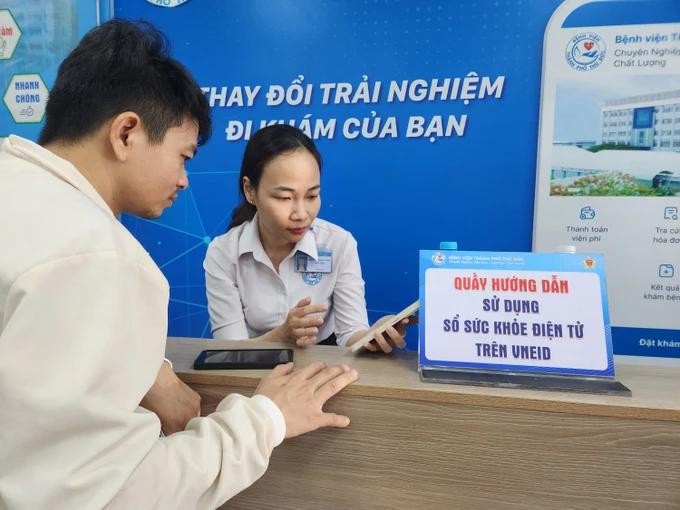
Various involved hospitals have been making efforts in disseminating information and encouraging patients to use the new usage. Nevertheless, the initial rollout has encountered certain obstacles.
Patients register for medical examination via VNeID
Recently, 22-year-old patient Le Bich Thao successfully registered for a medical examination at People's Hospital 115 using her Citizen Identification Card. This innovative approach, enabled by QR code technology, streamlined the process. Instead of the traditional method of manual data entry by hospital staff, Ms. Thao's information was quickly retrieved and displayed on the system within seconds of scanning her card.
When Ms. Thao visited People's Hospital 115 in early November, she was pleasantly surprised to learn that she could utilize the VNeID application on her mobile phone to register for a medical examination. This innovative approach eliminated the need for physical documents, streamlining the registration process.
Moreover, she discovered that the integrated Electronic Health Book at VNeID still stores her medical examination and treatment information from a few years ago completely.
Following a consultation with medical professionals, 66-year-old resident Pham Anh Dung of Ho Chi Minh City’s Tan Binh District verified his medical information on the VNeID application.
Head of the Examination Department at People's Hospital 115 Dr. Nguyen Thanh Hai announced that the hospital began utilizing the Citizen Identification Card for medical examination registration in 2023.
Starting in September 2024, the hospital initiated a pilot program for the Electronic Health Book, which is integrated with the VNeID application (level 2 identification), thereby enhancing the effectiveness of digital transformation within the healthcare sector.
Despite facing initial challenges, the adoption rate of the Citizen Identification Card and the VNeID application for medical examination registration has reached an impressive 99 percent, attributed to the continuous guidance provided to patients and the support from medical personnel. Additionally, the hospital is working on incorporating referral documents and follow-up appointments into the Electronic Health Book.
This conversion streamlines data entry for medical staff, simplifies processes for patients as well as enhances accuracy and prevents the misuse of others' health insurance cards.
Dr. Nguyen Thanh Hai envisions a future where connected medical data and patient access to their examination history will simplify doctors' assessments, enabling patients to manage their health conveniently through their phones, anywhere and anytime.
In Ho Chi Minh City, both Thu Duc City Hospital and Traditional Medicine Hospital are proactively implementing the Electronic Health Book within the VNeID application. By November 2024, the city is expected to have over 1 million Electronic Health Books integrated into the VNeID application, along with more than 58,000 re-examination appointment documents and over 5,000 referral documents also incorporated.
This shift has been likened to the transition to cashless payments in hospitals, as initial patient reactions were marked by hesitation. However, the adoption of card payments and QR code scanning has since become prevalent in hospitals and various other aspects of daily life.
The city health sector find solutions to remove bottlenecks
The availability of Electronic Health Book on the VNeID application, while both convenient and scientifically advanced, has not yet reached a significant number of patients. This is primarily due to the fact that elderly individuals constitute a substantial portion of those utilizing medical facilities. Many in this demographic either do not use smartphones or lack interest in technology, preferring traditional methods such as paper health insurance cards, physical medical examination records, and written prescriptions.
68-year-old resident Tran Thuy Van of Thu Duc City in Ho Chi Minh City is always worried about the security of her password, personal information, and the potential loss of funds from her bank account when accessing applications on her mobile device. Consequently, during her routine medical check-ups, Ms. Van carried a plastic bag filled with her medical records, X-ray films, and test results. Therefore, she experienced confusion several times as she struggled to locate the essential documents.
Director of Children's Hospital 1 Dr. Nguyen Thanh Hung acknowledged that young patients have warmly embraced the integration of the Electronic Health Book into the VNeID application.
However, this poses a challenge for elderly patients, individuals living in remote areas who may not have access to technology, those who have not yet upgraded their VNeID to level 2, or those who do not use smartphones.
Currently, children under 16 who doesn’t have a Citizen Identification Card and installment of the VNeID application are unable to connect their information to the Electronic Health Book. "It is recommended that effective solutions be devised to address the identified issues. Additionally, the synchronous deployment of the Electronic Health Book across provinces and cities is imperative, given the substantial influx of patients from other regions to Ho Chi Minh City for medical care.
In response to the aforementioned challenges, Ho Chi Minh City embarked on a 55-day, round-the-clock effort to effectively implement the Electronic Health Book on the VNeID application within its medical institutions.
Director of the Ho Chi Minh City Department of Health Associate Professor Tang Chi Thuong emphasized the pivotal role of the Electronic Health Book in facilitating health management, connecting medical data, and constructing a digital health ecosystem. He stressed the importance of hospitals prioritizing information technology, conducting staff training, and adopting innovative approaches to optimize the book's impact.
























